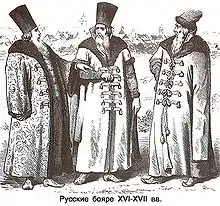boyar
English
Alternative forms
- boyard
- bolyard
Etymology

Russian boyars (16-17th century)
Pronunciation
- (UK) IPA(key): /ˈbɔɪɑː/, /ˈbəʊjɑː/, /bəʊˈjɑː/
Noun
boyar (plural boyars)
- (historical) A member of a rank of aristocracy (second only to princes) in Russia, Bulgaria and Romania.
- 1997, John Julius Norwich, A Short History of Byzantium, Penguin 1998, p. 159:
- Boris had abdicated in 889, leaving the throne to his son Vladimir, who had immediately identified himself with the boyar aristocracy which Boris had done his utmost to crush.
- 2007, John Darwin, After Tamerlane, Penguin 2008, p. 68:
- A long series of wars was fought in the sixteenth century to keep Polish influence at bay in the West Russian lands, and prevent it from seducing Muscovy's restless boyars, the warrior-barons whose independence the grand dukes were determined to crush.
- 2009, Diarmaid MacCulloch, A History of Christianity, Penguin 2010, p. 514:
- some of his family looked to Orthodox Christianity to sustain them, and not only many of his boyars but most of his subjects were Orthodox Christians.
- 1997, John Julius Norwich, A Short History of Byzantium, Penguin 1998, p. 159:
Synonyms
- barin
Translations
rank of aristocracy
|
|
Spanish
Verb
boyar (first-person singular present boyo, first-person singular preterite boyé, past participle boyado)
- (intransitive) to float
Conjugation
| infinitive | boyar | ||||||
|---|---|---|---|---|---|---|---|
| gerund | boyando | ||||||
| past participle | masculine | feminine | |||||
| singular | boyado | boyada | |||||
| plural | boyados | boyadas | |||||
| singular | plural | ||||||
| 1st person | 2nd person | 3rd person | 1st person | 2nd person | 3rd person | ||
| indicative | yo | tú vos |
él/ella/ello usted |
nosotros nosotras |
vosotros vosotras |
ellos/ellas ustedes | |
| present | boyo | boyastú boyásvos |
boya | boyamos | boyáis | boyan | |
| imperfect | boyaba | boyabas | boyaba | boyábamos | boyabais | boyaban | |
| preterite | boyé | boyaste | boyó | boyamos | boyasteis | boyaron | |
| future | boyaré | boyarás | boyará | boyaremos | boyaréis | boyarán | |
| conditional | boyaría | boyarías | boyaría | boyaríamos | boyaríais | boyarían | |
| subjunctive | yo | tú vos |
él/ella/ello usted |
nosotros nosotras |
vosotros vosotras |
ellos/ellas ustedes | |
| present | boye | boyestú boyésvos2 |
boye | boyemos | boyéis | boyen | |
| imperfect (ra) |
boyara | boyaras | boyara | boyáramos | boyarais | boyaran | |
| imperfect (se) |
boyase | boyases | boyase | boyásemos | boyaseis | boyasen | |
| future1 | boyare | boyares | boyare | boyáremos | boyareis | boyaren | |
| imperative | — | tú vos |
usted | nosotros nosotras |
vosotros vosotras |
ustedes | |
| affirmative | boyatú boyávos |
boye | boyemos | boyad | boyen | ||
| negative | no boyes | no boye | no boyemos | no boyéis | no boyen | ||
Further reading
- “boyar” in Diccionario de la lengua española, Vigésima tercera edición, Real Academia Española, 2014.
This article is issued from Wiktionary. The text is licensed under Creative Commons - Attribution - Sharealike. Additional terms may apply for the media files.